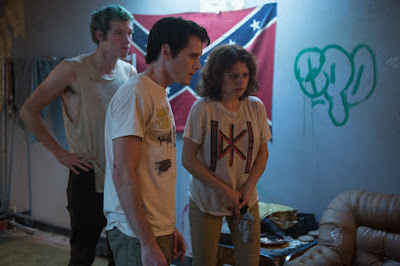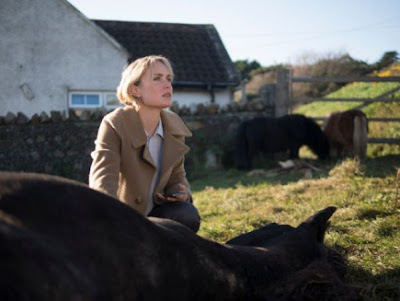How did a movie made in 1965 that is as wonderfully rich, deep, mysterious, poignant, funny and altogether marvelous as this one -- I will go on record right now as calling it the best film about a woman I have ever seen -- fail to obtain a theatrical release here in the USA until 2016? Let TrustMovies hazzard a guess: Because it was about a woman, that's why. And back in the 1960s, this was, well, not so important. Fellini's La Dolce Vita, made five years previous, got all the fuss. That one showed us the face of Italy via a successful male character, while I KNEW HER WELL (Io la conoscevo bene) tells the tale of a not-so-successful young woman struggling to find herself and her place in the Italy of the day.
The film's writer and director, Antonio Pietrangeli, shown at left, is practically unknown here in the U.S., and after viewing his movie you'll wonder how and why this could be. The filmmaker died, very untimely, in 1968 at the age of 49, and this was his penulti-mate full-length movie. But what a legacy it provides! (It will certanly make you want to see more of Pietrangeli's work.) Had I Knew Her Well obtained a U.S. theatrical release, I suspect the man's reputation would be much stronger here than it is. Certainly some of our critics would have seen how vital and important a movie it was. And remains.
The film also gave the stunning and very talented Italian actress Stefania Sandrelli, shown above and below, the best role of her quite illustrious career, and she rose to the occasion perfectly with the kind of intuitive, quiet-yet-spectacular performance that happens maybe once in a career.
This beautiful performer -- who made her internationally acclaimed debut in Divorce Italian Style, among the other two movies she made in 1961 -- plays a young girl from an impoverished farm family in the provinces who has come to Rome to make something of herself. She uses her beauty and what skills she has to find her way into some kind of career -- maybe films -- and we follow her from scene to scene, man to man, one career step to the next, and as she goes, we grow to know her well.
Pietrangeli's method is to show us one scene after another, some short, some lengthy, some in which Adriana is pivotal, others in which she is on the periphery, yet in every one she makes her mark. With each very well chosen scene (Pietrangeli both wrote and directed the film), we learn more about Adriana and grow increasingly fond of her, as the filmmaker and Sandrelli uncover layer after layer of her character: how she reacts to and thinks about men, her surprisingly fine and judicious sense of morality, her enormous humanity and love for those around her; and her own growth and change as she comes to understand the world of which she is a part.
To call Pietrangeli a humanist is too faint praise. His choice of scenes and how he allows Adriana to slowly bloom before us is something that only a great artist can maneuver. His camera and its framing, the splendid black-and-white cinematography, and the casting of all the roles -- small to large -- is impeccable. Yet it all flows by so easily and gracefully that you might think it were a near-improvised documentary.
In one of the most telling scenes, her current boyfriend, a successful writer (Joachim Fuchsberger, below), realizes how much more on-the-ball she is than he -- even we -- had thought. Later, at a party for a successful actor of the day, Adriana plays a supporting role, as that actor and his current producer make nasty fun of an over-the-hill actor (Ugo Tognazzi), as Adriana is photographed for a segment on a soon-to-be-released newsreel. The result of this provides the film with one of its most unsettling moments.
The movie is full of name actors -- from a very young Franco Nero to Mario Adorf, Nino Manfredi and Karin Dor (below, left) -- all of whom essay their small roles with aplomb. But it's Ms Sandrelli who proves the heart and soul of the film. See it, and you will never forget her. (The actress appears in a relatively current interview in one of the bonus features on the DVD and Blu-ray discs, and what she has to say to us about the film, its writer/director, and why it holds up so well today is so worth hearing.)
Not surprisingly, we also get a good, dark look at the Italy of this time period via all of Adriana's exploits, and what we see is not very nice. Whether it's the film industry, a boxing match, an abortion, the attentions of a wealthy young man (below) or the owner of the beauty salon where our girl initially works, Adriana is used, and usually rather badly. No one, neither characters nor filmmaker, makes the statement, yet we come away from the film not being able to help considering the place of a woman in society.
There's no mention of feminism in the movie, yet it speaks as strongly as any film ever made to and about women and how they were then and are now perceived. Yet the movie never preaches; it simply shows. After renting and watching the film via Netflix, I immediately went to my computer and ordered a Blu-ray copy and as soon as it arrived a few days later, I watched it again so that my spouse could see it (he was as impressed as I). This is the first time in years that I've purchased a film I've already seen, but I plan to keep it again and share it with as many people as I can. It's that special.
I Knew Her Well is available now from The Criterion Collection, on DVD and Blu-ray, for rental or purchase. Both versions provide, as usual via Criterion, exemplary transfers.
























































